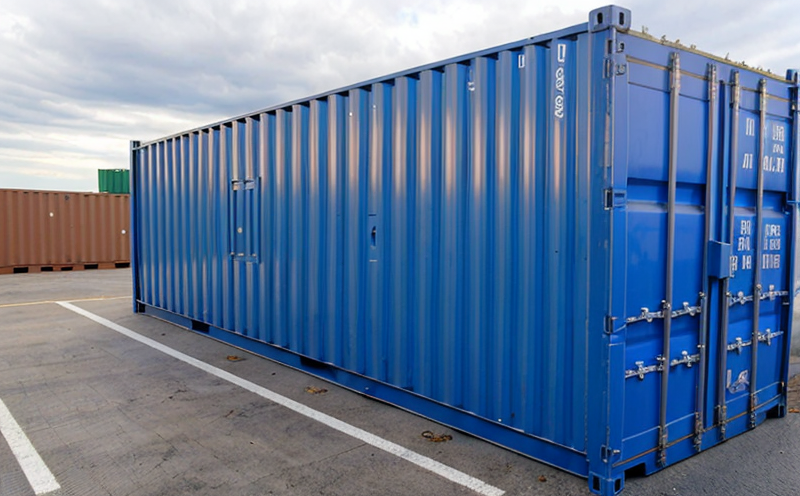DIN EN ISO 11357 Thermal Properties Testing of Plastic Storage Plastics
The DIN EN ISO 11357 standard specifies methods for determining the thermal properties of plastics, including their heat deflection temperature (HDT), Vicat softening point, and glass transition temperature. These tests are crucial in ensuring that plastic storage containers meet performance requirements under various environmental conditions.
Heat deflection temperature is a key parameter that determines how much load a material can withstand before it deforms permanently. This test is performed on specimens subjected to controlled loads at specified temperatures. Vicat softening point, another critical property, indicates the temperature at which the plastic melts and becomes pliable. Both tests are essential for quality assurance in storage containers where durability and safety are paramount.
The glass transition temperature (Tg) of a polymer is also evaluated using this standard. Tg defines when a material transitions from being brittle to becoming more flexible, affecting its performance at different temperatures. Understanding these thermal properties helps manufacturers ensure that their products remain functional under expected storage conditions without compromising safety or performance.
When selecting testing methods for plastic containers, it's important to consider the specific application and environmental factors they will encounter. For instance, containers intended for hot liquids require higher HDT values than those used in cold environments. Similarly, materials exposed to prolonged sunlight might need to maintain their integrity despite UV radiation.
The testing process typically involves preparing standard specimens according to ISO guidelines, placing them into a controlled environment where temperature and load are applied, and monitoring the response of the material over time. Precise control of these variables ensures accurate results that can be relied upon for quality assurance purposes.
Accurate measurement of thermal properties is essential not only for product development but also for regulatory compliance. Many industries rely on standards such as DIN EN ISO 11357 to verify their products meet international safety and performance criteria. By adhering strictly to these protocols, manufacturers can ensure they produce reliable, safe storage solutions that last through various environmental challenges.
Understanding the nuances of thermal properties testing allows for better product design decisions, leading to longer-lasting, safer containers that perform consistently across diverse applications. Whether it's food packaging or chemical storage tanks, ensuring correct material selection based on these tests can significantly enhance overall performance and longevity.
Eurolab Advantages
At Eurolab, we pride ourselves on offering comprehensive testing services tailored to meet the unique needs of our clients across various sectors. Our experienced team leverages advanced equipment and techniques to provide precise, reliable results that exceed industry expectations.
- State-of-the-Art Facilities: Equipped with cutting-edge laboratories designed specifically for polymer and plastics testing.
- Comprehensive Expertise: Our staff includes experts in thermal analysis who can interpret complex data accurately.
- ISO/IEC 17025 Accreditation: Ensuring all our processes meet the highest international standards, providing clients with confidence in their test results.
- Custom Solutions: We offer customized testing programs to address specific client requirements ensuring no detail is overlooked.
- Quick Turnaround Times: Efficiently handling samples from receipt through analysis and reporting, keeping you informed throughout the process.
We are committed to delivering high-quality services that contribute significantly towards your business success. Partner with Eurolab today and experience the difference quality makes in your testing needs.
Why Choose This Test
The DIN EN ISO 11357 thermal properties test is vital for ensuring plastic storage containers are suitable for their intended applications. By evaluating heat deflection temperature, Vicat softening point, and glass transition temperature, this standard helps identify materials capable of withstanding the stresses they will encounter during use.
Heat deflection temperature (HDT) tests reveal how much load a material can handle before deforming permanently. This is particularly important for storage containers that must maintain structural integrity even when filled to capacity or exposed to high temperatures. Vicat softening point measures the temperature at which plastic melts and becomes pliable, critical information for ensuring containers remain functional under various conditions.
Understanding these thermal properties allows manufacturers to select appropriate materials for specific applications, enhancing both safety and performance. For instance, HDT values dictate whether a container can safely store hot beverages or chemicals without risk of deformation, while Tg helps determine the temperature range over which a material remains stable.
In addition to ensuring compliance with regulatory requirements, these tests provide valuable insights into the behavior of plastic materials under stress and environmental conditions. This information is invaluable for R&D teams looking to improve product designs or troubleshoot issues in existing models.
By investing in thorough thermal properties testing, businesses can build trust with their customers by demonstrating a commitment to quality and safety. Moreover, accurate assessment of these properties ensures that storage containers meet the demands set forth by industry standards, further enhancing overall performance and longevity.
Use Cases and Application Examples
The DIN EN ISO 11357 thermal properties test finds extensive application in industries where plastic storage containers play a crucial role. These tests are particularly relevant for manufacturers of food packaging, chemical storage tanks, medical supplies, and consumer goods.
For example, in the food packaging industry, ensuring that containers can withstand high temperatures without deforming is essential to prevent contamination or compromised product integrity. In chemical storage applications, materials must be able to maintain their form and function under extreme conditions, protecting both workers and the environment from potential hazards.
In medical supplies, the use of appropriate plastic materials ensures safety and effectiveness during prolonged storage periods. Consumers also benefit from these tests as they contribute to safer, more reliable products that perform consistently throughout their lifecycle.
R&D teams often rely on thermal properties testing when developing new products or improving existing ones. By understanding how different factors affect material performance, engineers can make informed decisions about design changes that enhance functionality and durability.
Additionally, these tests are crucial for compliance with international standards such as DIN EN ISO 11357. Adhering to these guidelines not only ensures product quality but also facilitates market access by meeting regulatory requirements worldwide.





